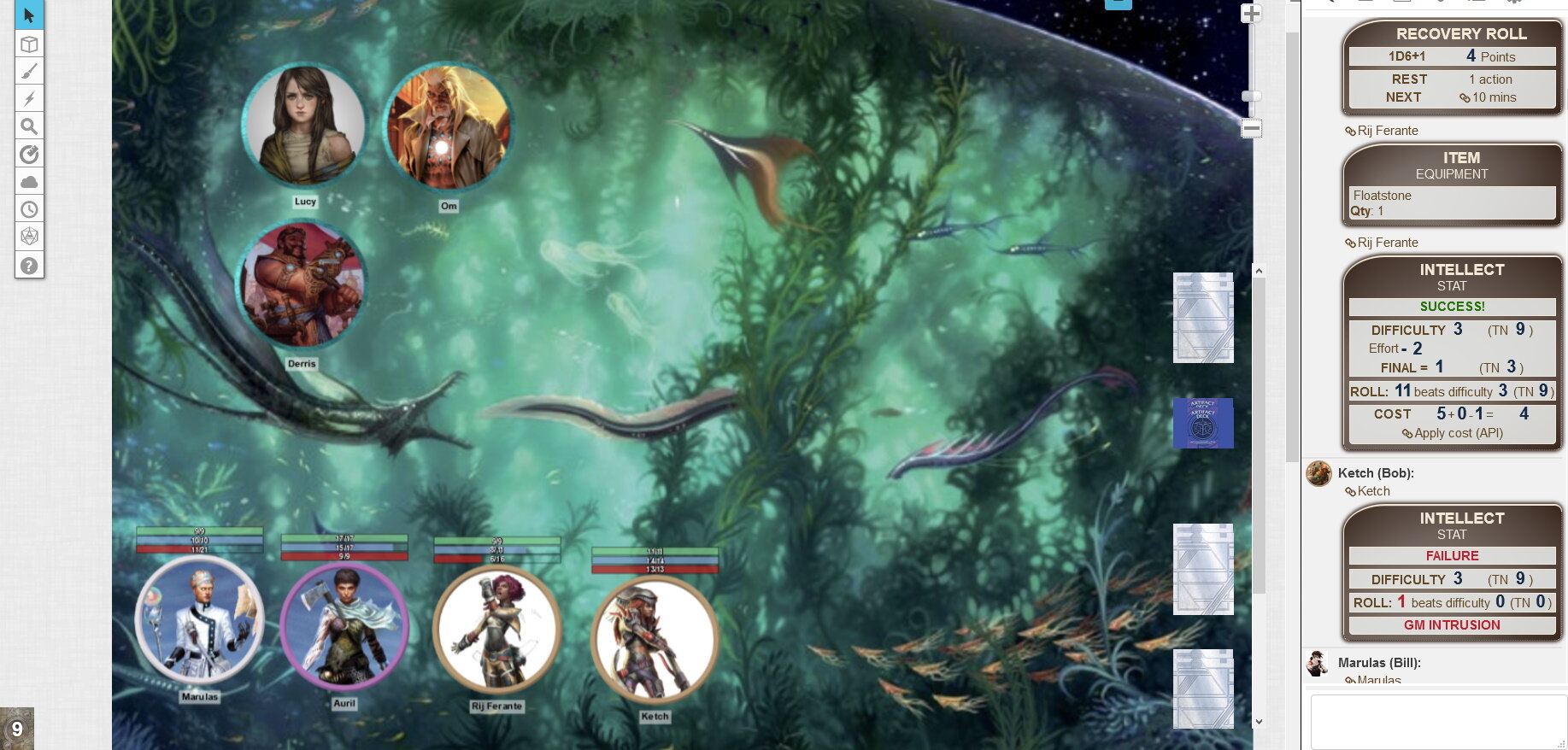Is Cypher System Rules Lite?
I see lots of folks who love the Cypher System, like I do, call it rules lite. That’s crazy talk. I’ll explain why.
Numenera, a Cypher System game in Roll20
BTW, I’m not saying rules light is better or worse. That’s personal preference.
Note: Crunch means complicated rules. Rules lite would be low crunch.
Lite-ish?
There are plenty of ways Cypher System rules are easier to use than many games, including Dungeons and Dragons (any edition).
Monster stat blocks.
Say you are the GM, and your players do something unexpected, and you need a monster. Or NPC. Now!
Cypher System stat blocks can be as simple as one number, typically from 1 to 10. Say, 4. 4 can be a full stat block.
If a PC tries to attack it, dodge it, hide from it, flirt with it, or any other kind of interaction with it they need to succeed on a difficulty 4 task. Easy!
Most Cypher System creatures are a bit more interesting than that, but when it’s time to improvise on the fly, one number is all you need.
Easy to Adjudicate
Instead of a rule for everything, a Cypher System GM picks a difficulty from 1 to 10 to rule on anything the players come up with. That one number is used for how easy it is to open a lock, pilot a starship, whatever. Easy!
Narrative Actions
Player and GM Intrusions can change what’s going at any time. Rules fully support player and GM improvisation. Experienced Cypher System GMs pretty much agree that “whatever fits the story best” is what should happen.
Not That Lite
So, Cypher System is more rules lite many other games.
But compared to FATE, GUMSHOE, Powered by the Apocalypse, Dread, or Fiasco? Cypher System is way more complicated. Read on.
Complex/Rich Player Characters
Cypher System is level based, like D&D. And just like in D&D, as your character progresses they get ever more complicated to play.
A starting character typically has six special abilities to manage. After they level up, it can exceed 20. Way more complex than characters in many other games.
Some abilities are pretty easy to manage, like Blameless.
Blameless: You are trained in one of the following: deception, stealth, or disguise. Enabler.
Others are complex, like Call Through Time.
Call Through Time (6+ Intellect points): You call a creature or person of up to level 3 from the recent past, and it appears next to you. You can choose a creature that you’ve previously encountered (even if it is now dead), or (no more than once per day) you can allow the GM to determine the creature randomly. If you call a random creature, it has a 10 percent chance of being a creature of up to level 5. The creature has no memory of anything before being called by you, though it can speak and has the general knowledge a creature of its type should possess. The time-shifted creature does your bidding for as long as you concentrate on it, but you must use your action each turn to direct it; otherwise it returns to the past.
In addition to the normal options for using Effort, you can choose to use Effort to call a more powerful creature; each level of Effort used in this way increases the creature’s level by 1. For example, applying one level of Effort calls a specific creature of up to level 4 or a random creature with a 10 percent chance of being up to level 6. Action.
Using Effort isn’t Simple
You know those difficulty numbers I talked about? A really cool thing about the Cypher System is that the players can spend points to lower the number, making it easier to succeed. Personally, I think it works great, but I have encountered many players who struggle with it.
You spend N levels of effort, each level lowers the difficulty number by one. The first level costs 3, the rest cost 2. You can get a discount (called an edge). You can spend effort to do two things (like making it easier to attack and also causing extra damage), but you can’t use your discount on both. Got that?
I’ve seen players struggle with effort after playing for a year.
The Three Times Table
If I give you a difficulty number, you have to roll that number times three or less on a d20 to succeed. This may shock you, but some people struggle with multiplying by three. This may more a problem of our education system than game design.
Bottom Line: Medium Crunch
Cypher System is easier to learn and run than many, but not all, games. It’s designed to let the GM improvise with ease.
Where is Cypher System on the Crunch-O-Meter? I’d say more complex than Call of Cthulhu, another medium complex game. And way more than GUMSHOE or FATE, games I consider rules lite. Cypher is less crunchy than D&D and its siblings, games I consider rules heavy. Your Crunch-O-Meter may vary.
Low complexity and ease of improvisation also means less prep-work for the GM. So if you find 5E prep stressing you out, but want a level based system with some heft to it, try Cypher System. Middle-weight games might be your Goldilocks Zone.
But if you want to ditch the heft, and really slim down, try an actual rules lite game. There are a lot. I’m a big fan of FATE, GUMSHOE, Cthulhu Dark, and Monster of the Week. FATE Accelerated is simpler than standard FATE. There are super-lite games with the entire rules set on one or two pages like Deathbringer.
How much crunch do you like?
The Sun Below: That’s How the Light Gets In
a Cypher System adventure for Numenera.
Get your medium crunch adventures right here!





